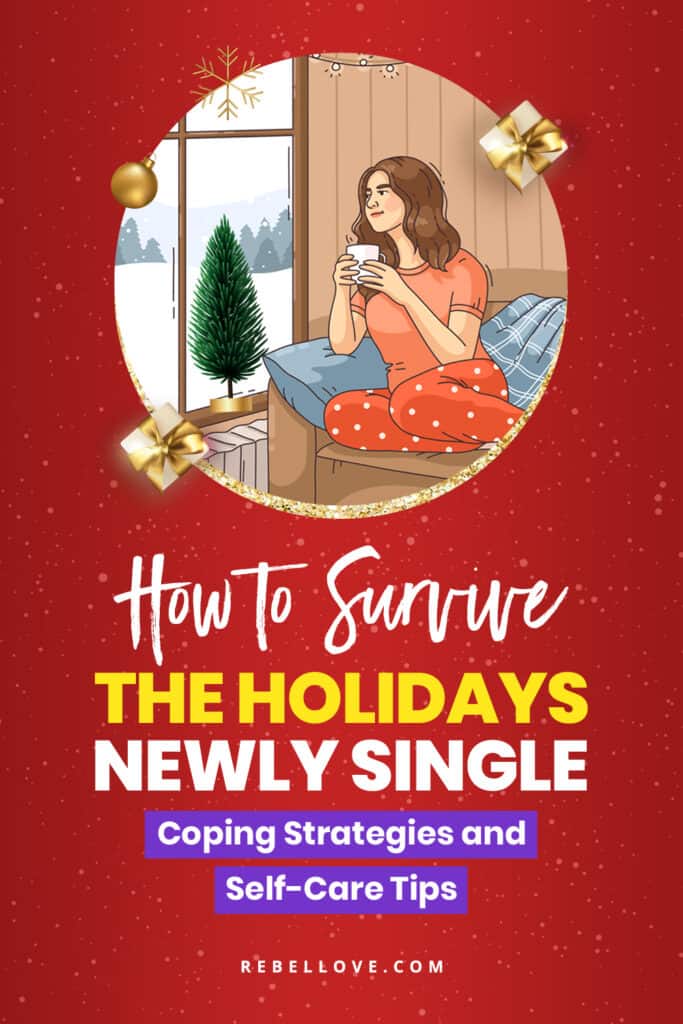This post may contain affiliate links and Rebel Love may be compensated for purchases visitors make through these links. We only promote products and services we really care about and that we think are useful. Read the full policy here.
The holiday season can be an intense time of year, especially when navigating it as a newly single person.
Family gatherings, in particular, tend to bring forth intrusive questions, high expectations, and unsolicited advice, often accompanied by sympathetic remarks like “you poor thing.” This, of course, can add to the emotional weight of the breakup, and explanation fatigue (aka, reminding that one aunt for the umpteenth time that no, Josh will NOT be joining us; we broke up last month).

Isn’t this supposed to be the happiest time of the year?
Let’s explore how you can not only survive the holiday season as a newly single person, but how you can thrive as one.
To do this, it’s important to prioritize a sense of connection on your own terms. Whether that involves embracing solitude this holiday season, mustering the courage to visit family, or embarking on new traditions, incorporating effective coping strategies and practicing self-care can truly transform this time of year into the jolliest one yet!
Let’s delve into some practical tips to navigate the festivities with resilience and make this holiday season a period of personal growth and joy despite the changes in your relationship status.
Reframing Traditions
Finding new ways to celebrate that resonate with what matters to you, rather than what’s expected of you, can help support your new situation, and even propel you towards like-minded people, eliminating the threat of holiday loneliness. Here’s how to do just that:
1. Create Personalized Traditions:
Embrace the opportunity to redefine your holiday traditions by incorporating activities that resonate with your newfound single status. Whether it’s planning a solo winter getaway, hosting a festive gathering for friends, or dedicating time to pursue a hobby or interest, crafting new traditions that align with your current lifestyle can bring a sense of empowerment and fulfillment.
2. Focus on Self-Discovery:
Use the holiday season as a chance for self-discovery and personal growth. Attend workshops, classes, or events that align with your interests and allow you to explore new facets of yourself. This not only provides a distraction from the traditional holiday expectations but also opens doors to new experiences and connections, fostering a positive and enriching holiday season.
3. Volunteer or Give Back:
Shift the focus from personal circumstances by engaging in acts of kindness and giving back to the community. Volunteering for local charities or participating in community service projects not only provides a meaningful way to spend the holidays but also allows you to connect with others who share similar values. This shift towards a more altruistic approach can bring a sense of purpose and fulfillment, making the holiday season a positive and transformative experience.
Creating a Support System
Building a network of support to lean on during the holiday season can be a great way to navigate spending the holidays alone and newly single.
1. Host a Friendsgiving or Festive Gathering:
Take the initiative to strengthen your social connections by organizing a Friendsgiving or a holiday gathering. Invite friends, colleagues, or acquaintances who may also be looking for companionship during the season. Creating a supportive and festive environment not only helps build new connections but also reinforces the sense of community and shared experiences.
2. Join Social or Interest-Based Groups:
Explore local social or interest-based groups that align with your hobbies or passions. Whether it’s a book club, fitness class, or a community organization, these groups provide an excellent platform to meet like-minded individuals. Engaging in activities you enjoy with others fosters organic connections and expands your social network, providing a supportive community during the holidays.
3. Seek Out Support Groups:
Consider joining support groups specifically designed for individuals navigating the holidays under similar circumstances. Whether online or in-person, these groups provide a space to share experiences, exchange coping strategies, and offer mutual support. Building connections within a support network can be invaluable during challenging times, making the holiday season more manageable and emotionally fulfilling.
Embracing Self-Care
Delving into self-care practices to prioritize your well-being and emotional health throughout the holiday period serves as a powerful antidote to loneliness and aids in processing any lingering negative feelings from the breakup.
Putting ourselves first not only fosters positive psychology but also cultivates a sense of gratitude, creating a transformative space for personal growth and emotional resilience. Here are a few ways to do just that:
1. Establish a Relaxing Ritual:
Develop a personalized self-care ritual that you can consistently practice throughout the holiday season. Whether it’s dedicating time for meditation, enjoying a warm bath, or simply indulging in a favorite book, having a regular, calming routine helps anchor your days and provides a sanctuary for recharging your emotional well-being. Plus, it doesn’t have to end when the holiday season ends!
2. Set Boundaries and Learn to Say No:
Recognize the importance of setting boundaries to protect your emotional health. Assess your commitments and obligations, and don’t hesitate to decline invitations or requests that may overwhelm you. Learning to say no when necessary allows you to prioritize self-care and allocate time for activities that truly nourish your well-being.
3. Prioritize Healthy Habits:
Maintain a focus on healthy habits, including regular exercise, balanced nutrition, and sufficient sleep. Physical well-being is closely linked to emotional health, and prioritizing these fundamental aspects contributes significantly to your overall resilience during the holiday period. Incorporate activities that bring joy and relaxation, such as nature walks, yoga, or mindful eating, into your routine.
Managing Loneliness
During festive times, coping strategies for dealing with feelings of loneliness and isolation become essential for maintaining emotional well-being. Here are some specific tips for combat loneliness and increasing a sense of connection:
1. Connect Virtually with Loved Ones:

If in-person meetups aren’t possible, or feel too overwhelming, leverage technology to bridge the gap and connect with friends and family. Schedule video calls, virtual game nights, or even joint cooking sessions to recreate the sense of togetherness during the festive season. Staying socially connected, even through screens, can significantly alleviate feelings of loneliness and isolation.
2. Engage in Solo Enjoyment and Hobbies:
Use the holiday period as an opportunity to indulge in activities that bring you joy and fulfillment on a personal level. Whether it’s exploring a new hobby, reading, or practicing mindfulness through meditation, investing time in solo activities not only distracts from feelings of isolation but also empowers you to enjoy your own company and build a sense of self-contentment.
3. Participate in Community Events or Volunteer Work:
Again, seeking local community events or volunteer opportunities happening during the festive season can eliminate the feeling of loneliness.
Engaging in such activities not only provides a chance for social interaction but also allows you to contribute to a larger cause, fostering a sense of purpose and connection. Being part of communal efforts or events can combat feelings of loneliness by creating shared experiences with others.
Setting Boundaries
Use these actionable tips to help navigate questions about your relationship status from well-meaning family and friends. Let those conversations be smoother by setting clear boundaries:
1. Prepare a Gentle Response Script:
Develop a set of responses in advance to gracefully navigate inquiries about your relationship status.
Crafting a gentle yet firm script helps you respond confidently and maintain control over the conversation. For example, express appreciation for their concern and let them know you prefer not to discuss your relationship at the moment. Having prepared responses can mitigate awkwardness and ensure that your boundaries are respected.
2. Establish Clear Communication Guidelines:
Set clear communication guidelines with your close circle by letting them know how you prefer to handle discussions about your personal life. This might involve conveying your need for privacy during gatherings or specifying the types of questions you’re comfortable answering. Providing guidance in a respectful manner helps create understanding and reinforces your boundaries.
3. Divert the Conversation Positively:
Redirect conversations towards positive and neutral topics when faced with probing questions. Share exciting aspects of your life, recent accomplishments, or future plans to shift the focus away from your relationship status. Steering the discussion towards uplifting subjects not only maintains a positive atmosphere but also subtly communicates your preference for privacy on certain matters.
Focusing on Gratitude
Shift your focus from what’s lost to what’s still present by practicing gratitude and mindfulness.
1. Gratitude Journaling:
Start a daily gratitude journal to consciously focus on the positive aspects of your life. Regularly jot down three things you are thankful for, emphasizing the present rather than dwelling on what might be lost. This practice cultivates a mindset of appreciation, redirecting your attention towards the abundance of positive experiences and relationships that still enrich your life.
2. Mindful Meditation Practices:
Incorporate mindfulness meditation into your daily routine to stay grounded in the present moment.
Engaging in mindfulness exercises, such as deep breathing or body scan meditations, helps shift your focus away from past losses and future uncertainties. By fostering a heightened awareness of the present, mindfulness enables you to appreciate the richness of your current experiences and the relationships that contribute to your well-being.
3. Create a “Gratitude Jar” or Board:
Establish a tangible representation of gratitude by creating a “Gratitude Jar” or a visual board.
Whenever you experience a positive moment or someone does something kind, write it down on a note and place it in the jar or add it to the board. This tangible display serves as a constant reminder of the positive elements in your life, fostering a mindset of appreciation and redirecting your attention towards what remains rather than what may have been lost.
Solo Celebrations
Brainstorm and put into motion ideas for solo holiday experiences.
1. Solo Holiday Getaway:
Treat yourself to a solo holiday getaway, exploring a destination of your choice. Whether it’s a cozy cabin in the mountains or a beach retreat, this experience provides an opportunity for self-discovery and relaxation. Embrace the freedom to create your own schedule, indulge in local cuisine, and engage in activities that bring you joy, all while celebrating the holiday season on your own terms.
2. Personalized Holiday Traditions:
Invent new holiday traditions that cater to your interests and preferences. This could involve decorating your living space in a way that brings you joy, preparing a special holiday meal just for yourself, or dedicating time to a cherished hobby. By customizing your holiday experience, you not only infuse personal meaning into the season but also create moments of joy and celebration that align with your current lifestyle.
3. Creative Self-Care Retreat:
Design a personalized self-care retreat during the holiday season. Create a schedule that includes activities focused on rejuvenation and self-indulgence. This could involve spa days at home, artistic pursuits like painting or writing, or even a movie marathon featuring your favorite films. Treat yourself to decadent meals, experiment with new recipes, and take the time to pamper yourself. This solo retreat allows you to recharge, reflect, and celebrate the holidays in a way that prioritizes your well-being and personal enjoyment.
Navigating Substance Use
Lastly, it’s important to recognize the potential pitfalls of increased substance use, such as alcohol, during the holidays and exploring healthier ways to cope with emotions and stress. The goal here is to understand the potential negative impact of relying on substances as a coping mechanism and seeking alternatives to ensure a more balanced and positive experience.
1. Sensory Distraction Objects:
Carry a small object with interesting textures or shapes, like a smooth stone or a textured keychain. When stress starts to creep in, focus on the tactile sensations of the object. Engaging your sense of touch can provide a grounding experience, helping to divert attention from the urge to turn to substances.
2. Micro-Mindfulness Exercises:
Practice micro-mindfulness exercises discreetly in social settings. For example, take a moment to focus on your breath, paying attention to each inhale and exhale. Alternatively, engage in a quick mental scan of your surroundings, noting colors, textures, and sounds. These brief mindfulness moments can help center your thoughts and manage stress without drawing attention to yourself.
3. Create a Wellness Plan:
Develop a personalized wellness plan that includes alternative strategies for managing stress and emotions. Outline specific actions, such as regular exercise, healthy nutrition, and sufficient sleep, that contribute to your overall well-being. Having a well-defined plan provides structure and reinforces positive habits, reducing the likelihood of turning to substances as a default coping mechanism.
4. Sober Social Sanctuary:
Transform social gatherings into sober-friendly spaces by organizing alcohol-free events or BYO (Bring Your Own) mocktail parties.
Encourage guests to bring their favorite non-alcoholic beverages or create a signature mocktail station. This not only fosters a supportive environment for those choosing to be sober but also promotes creativity and camaraderie as everyone shares and enjoys unique, alcohol-free concoctions.
5. Seek Professional Guidance:
If you find it challenging to break away from reliance on substances, or are simply finding the holiday season too overwhelming, consider seeking professional guidance.
A mental health professional or addiction counselor can offer personalized strategies and support tailored to your situation. Their expertise can assist you in addressing the root causes of stress and finding healthier ways to cope, leading to a more sustainable and positive emotional experience.
The Gift of Self-Discovery
Amidst the holiday cheer, being newly single can amplify feelings of loneliness. But this season, let’s shift the focus from what was lost to what there is to gain.

As a solo celebrant, lean into intentional choice and self-care. Reframe traditions, build support systems, and proactively manage stress to not just survive but thrive this holiday season!
Breakups are transformative, and this holiday, prioritize personal growth and joy. Celebrate connections on your terms, revel in meaningful solo traditions, and nurture your well-being.
Let this season be a canvas for self-discovery and resilience—a holiday experience crafted with self-compassion and the goal of healing.
Until then,
Happy holidays, friends!
Quean Mo xx